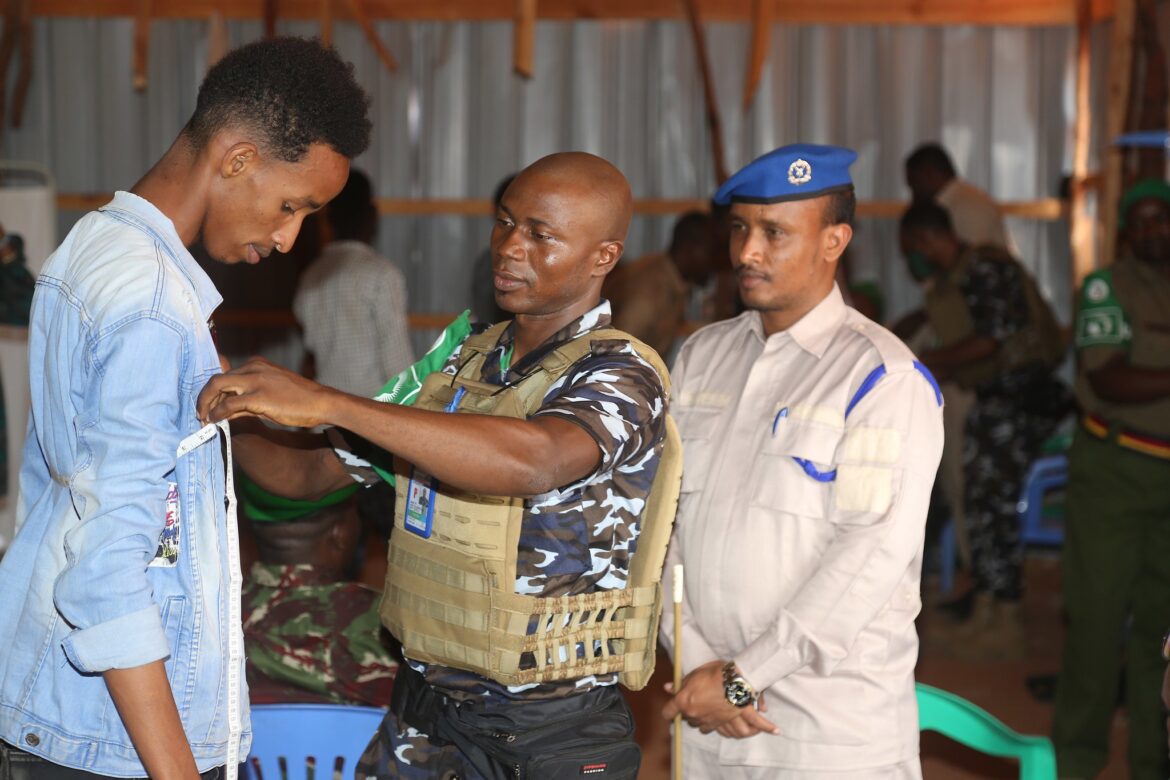Mogadishu 25 August 2022 – At a police recruitment centre in Kismayo, Somalia’s southern city, young men and women step forward to register at the numerous enlistment desks.
The exercise is part of a process to recruit 300 police officers to secure the Jubaland State of Somalia. At the recruitment centre, African Union Police officers provide support, with measurements, data entry and conducting medical and fitness tests of the potential recruits.
By December 2024, it is anticipated that Somali Security Forces (SSF) will take over security responsibilities from the African Union Transition Mission in Somalia (ATMIS).
So, this recruitment exercise is part of ongoing efforts to develop the regional police forces, with a wider goal to boost police generation in the country. Already, 150 recruits are undergoing a three-month basic training.
The ATMIS Police Chief of Staff, Commissioner of Police Rex Dundun, acknowledges the enormity of the task and the importance of training Somali police personnel.
“We have only a short time to prepare Somalia’s police to handle its internal security. It is a race against time,” says CP Dundun.
Somalia’s National Security Architecture (NSA), endorsed by the Federal Government of Somalia and the federal Member States in 2017, recommended a police force of 32,000 personnel.
In line with the NSA, Somalia aims to recruit a sufficient number of police personnel not only to enforce law and order but also secure liberated areas and population centres.
Capacity building and ATMIS police mandate
AMISOM, the previous mission, recruited and trained police personnel in Mogadishu and the federal Member States, who now enforce law and order in the country. Today ATMIS Police builds on these earlier efforts.
Somali Police Force Spokesperson, Major Abdifatah Ahmed Hassan acknowledges the central role that the AU police has played in the rebuilding and transformation of the country’s police.
“They have trained, mentored and worked alongside station commanders in various areas of operation and also contributed in building the leadership capacity of the Somali Police Force,” says Maj. Abdifatah in an interview. He adds, “As we prepare for the transition, we will continue to collaborate with ATMIS.”
ATMIS Police are mandated to provide training, on-the-job mentoring, and advice to the Somali Police Force. The training also focuses on building capacity and recruiting young officers to replace the older ones.
Established guidelines require clan leaders, women representatives, civil society and police officers to form oversight committees to vet prospective police recruits.
The AU Police first deployed in Somalia in 2009.
Aiming to improve the security situation in Somalia, the AU Police has trained and mentored more than 8,000 Somali police officers in Jubaland, Hirshabelle and Southwest, including Mogadishu.
“To date, we have trained about 8,167 Somali police officers, both in federal member states and Mogadishu,” says Dundun.
The training covers aspects such as management, election security, human rights, traffic management and community policing, prevention of sexual and gender-based violence.
Hirshabelle is one of the states that have benefited from the support by the AU Police.
The Hirshabelle Deputy Police Commissioner, Col. Hassan Kafi Mohamed Ibrahim says the AU police has also provided support in critical areas, such as training of personnel, construction and rehabilitation of police stations and provision of equipment.
“ATMIS has helped us a lot especially in the training aspect. They have trained three batches of police in Hirshabelle. The police officers are now deployed in the major towns and at numerous checkpoints on major roads that lead to Jowhar, greatly improving the security in the area,” says Col. Hassan.
Today, the recruited police personnel increasingly support law enforcement in areas liberated from Al-Shabaab control.
Other support to the Somali Police Force
With the resumption of recruitment under ATMIS, the exercise will be extended to other federal Member States.
As part of its infrastructure improvement initiative, the ATMIS Police has constructed, renovated, and equipped about 20 police stations in Jubaland, Hirshabelle, and Southwest States as well as Mogadishu.
In addition, AU Police has assisted with efficient policing, setting up specialized desks in police stations and developing police human resource databases at the Federal and State levels.
As part of the operational support during the elections, the AU Police deployed personnel to areas hitherto had no police presence, such as Barawe, Garbaharey, and Dhusamareb. ATMIS Police provided logistical support, conducted election security training, and secured election venues.
“ATMIS Police were instrumental in securing the elections. They worked tirelessly to ensure everything was fine, and we are grateful for that,” says First Lieutenant Bishar Hussein Jimale, the Beletweyne District Police Commander.
“It would have been extremely difficult,” Maj. Abdifatah says, “to conduct this exercise without the support of ATMIS. We successfully conducted these elections without any major incidents.”
With the parliamentary and presidential elections concluded, the transition and handover are now the focus. The priorities of the AU Police include, supporting police generation, training, equipment, and infrastructure development.
According to CP Rex Dundun, “The aspiration and goal is for the Somali Police Force to be able to take over the internal security of Somalia by December 2024.”



